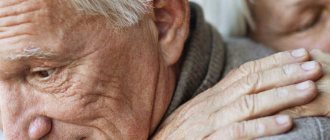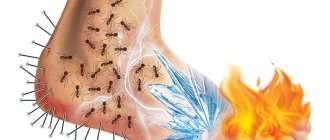Depression is one of the most common diseases of the nervous system in older people. According to WHO, depressive disorder occurs in approximately 40% of people over 55 years of age, but only a few of them receive qualified help; the rest may not be aware of their problem or do not want to seek help from a psychiatrist or psychotherapist. What is the reason for such a prevalence of the disease in old age and how can we help patients suffering from depressive disorder?
What is depression
Depression is a mental disorder that occurs against a background of stress, nervous tension, hormonal imbalance or somatic diseases and is characterized by a sharp decrease in mood, apathy, decreased motor activity and negative thinking.
Unfortunately, in old age people have several prerequisites for the development of this disease. Most often, women aged 50-60 years suffer from depressive disorders, men aged 55-65 years are approximately 2 times less likely to suffer from depressive disorders.
Causes of the disease
The development of the disease at this age is associated with:
- Age-related changes in the nervous system - with age, the adaptive capabilities of the psyche decrease, the reserves of the nervous system are depleted, and a person begins to react much more sharply to any stimuli. Stress, nervous strain and fatigue, which the patient could easily cope with at 35-45 years of age, may be too strong at an older age and cause severe nervous breakdown or depression.
- Somatic diseases - almost all older people suffer from one or another somatic disease, and the majority, by the time they retire, have a whole “bouquet” of diseases. This not only negatively affects the mood and well-being of an elderly person, but can also provoke the development of depression, which occurs due to constant poor health, limitation of motor and social activity. Another cause of depressive disorder in old age is vascular diseases of the brain. In addition to pathologies of the nervous system, the following diseases can provoke depression: pathologies of the thyroid and parathyroid glands, diabetes mellitus, arterial hypertension.
- Changes in social status - it has long been noticed that after retirement the condition of many men and women deteriorates sharply. Some begin to suffer from exacerbation of chronic diseases, while others may develop so-called “retirement depression.” The main reason for the sharp deterioration of the condition is the lack of usual activities; the person suddenly finds himself in social isolation, feels unnecessary, useless, and does not know what to do in his free time. “Workaholics”, careerists who devote all their free time and thoughts to work, most often suffer from such problems. Typically, “retirement depression” is faced by men who cannot give up their usual social role and do not try to find “another niche.” Women, as a rule, experience retirement more easily, as they have the opportunity to devote more time to their family, children and grandchildren.
- A decrease in social circle, severance of family ties and loneliness are the most common and most significant reasons for the development of depression in old age. With age, it becomes more and more difficult for a person to make new acquaintances, establish relationships, the circle of friends steadily decreases, and often, in old age, such a patient is left alone. Even more difficult in old age is the severance of family ties. Depressive disorder in older women most often develops precisely because of this - by the age of 50-55, children grow up and do not need care, the house becomes empty, and the “empty nest” syndrome occurs. Also, according to statistics, more than half of women over 40 years old suffer from a lack of personal life, which also negatively affects the state of the emotional sphere.
- Taking medications – with the constant use of many medications, secondary depression can develop. The most “dangerous” medications are: antihypertensive drugs (digoxin, methyldopa, calcium channel blockers, beta blockers), corticosteroids (prednisolone), analgesics, sleeping pills.
Loneliness and analysis of past years
Senile depression is characterized by the fact that a person feels complete loneliness and isolation from the world. At the same time, he sees children and youth whose lives are just beginning, with many new discoveries ahead of them. This aggravates the situation and makes it difficult to survive the crisis. Proper treatment changes a person's perspective and reaction to it. Communication with young people begins to inspire, not depress.
During a crisis, a person begins to analyze his past, remember the bad and the good. I remember everything, but thoughts in the early stages of the disease focus on what was missed and not done. Constantly thinking about it, a person becomes dependent on these thoughts. Later, he already believes that if he had acted differently in some situation, his life would have turned out completely differently.
At this stage, a person may begin to blame his loved ones, children, or spouse for his problems. It comes to absurd thoughts that someone else is to blame for his old age, that it is not a natural process. Real life ceases to interest the patient; everything seems too insignificant and unimportant to him in comparison with the inner experiences that he cherishes within himself.
Support in such cases must be provided very carefully, because it is often perceived as pity and rejected.
Symptoms of the disease
The older the patient is, the more difficult the treatment is - this rule works 100% for depressive disorders. Diagnosing and treating senile depression is much more difficult due to the blurred clinical picture of the disease and the patient’s reluctance to admit the presence of the disease and cooperate with specialists.
In contrast to the “classic” symptoms of depression, elderly patients practically do not complain of worsening mood, sadness or melancholy, and changes in behavior and deterioration in well-being are associated with age-related changes or somatic diseases.
The characteristic symptoms of depression in old age are:
- Representatives of the older generation are ready to explain changes in mood - despondency, irritation, apathy and negative thoughts - with anything, but not pathologies of the nervous system. Unfortunately, any modern citizen can find many reasons for negative thinking, irritation or bad mood - from political instability and the threat of terrorism in the country to difficult material and living conditions, health problems and lack of attention and care from loved ones.
- Decreased activity - a recently cheerful and fairly active person stops leaving his home; any need to go somewhere makes him nervous, feeling unprotected and weak. Such an event requires either long-term “preparation,” primarily moral, or causes anxiety and anxiety in the patient. As depression develops, a person’s range of interests narrows, he stops attending entertainment events, friends and relatives, just walking down the street, he may refuse to leave the house at all, or he limits everything to trips to the doctor and to the store.
- Increased anxiety is another characteristic symptom of depression. Patients begin to worry and worry excessively about themselves and their loved ones. This can be expressed in long conversations, attempts to control over the phone and in person, or in constant worries that greatly worsen the patient’s condition.
- Sleep and appetite disorders – with all types of depression, problems with sleep and appetite are observed. In old age, insomnia, difficulty falling asleep, restless shallow sleep and a sharp decrease in appetite often occur.
- Impaired memory and concentration. Manifestations of depression are often similar to the symptoms of senile dementia; patients have difficulty concentrating on what is happening, their memory and cognitive functions deteriorate.
- Complaints about deterioration in health. One of the most characteristic symptoms of senile depression is constant complaints about deterioration in health, existing illnesses and problems with sleep, appetite, blood pressure, and so on. It is with these complaints that up to 90% of all patients suffering from depression are treated. And since older people always have disturbances in the functioning of certain organs and systems, they begin to be actively treated. But with clinical depression in the elderly, no treatment of somatic diseases will help improve well-being and mood.
- Obsessive ideas of worthlessness, self-blame or blaming your loved ones are another big problem for all people with depression. In old age, it is much easier for a person to “find” the cause of his condition; he can blame his loved ones for this: “they don’t pay enough attention,” “they no longer need me,” or himself – “I am now weak, useless, a burden for my loved ones.” . In severe cases, the patient's condition is aggravated by delusional disorders, suicidal thoughts or pathopsychological changes in behavior. Thus, patients may refuse to leave the house, communicate with loved ones, or blame them for bad attitude, lack of care, and so on.
Depression in old age develops slowly, imperceptibly for others, it’s just that the patient’s character begins to “deteriorate”, he stops leaving the house, turns into a constant grumbling, dissatisfied person with everything, who gets irritated over the most insignificant reason and torments loved ones with grievances, anxious premonitions, gloomy omens or complaints about your poor health.
Drug treatment
It is recommended to start treatment with antidepressants.
For each patient, the drug and its dose are selected strictly individually, since the drug must not only be combined with others taken by the patient (for example, antihypertensives or pacemakers), but also not have side effects on organs with which there are already problems. Treatment of older patients begins with a minimum dose of the “lightest” drugs. The most popular drugs in gerontology are:
- Atarax. It has an antidepressant and anti-anxiety effect and does not cause addiction or dependence. Stimulates the functioning of the nervous system, indicated for anxiety disorders arising from neurological and mental diseases.
- Leviron is an antidepressant with a pronounced sedative effect. It can be used for all types of depression and is considered one of the safest drugs for elderly patients.
- Melipramine is a stimulating antidepressant that improves mood and stimulates the activity of the nervous system. It is prescribed to increase the mental and general tone of the body, increase physical activity and improve mood. Indications for taking the drug are depression, accompanied by apathy, decreased motor activity, melancholy, sleep and appetite disorders.
- Tsipramil is a drug for long-term use, has a sedative and antidepressant effect. Suitable for use in patients with concomitant somatic diseases.
How to fight
How to deal with insomnia during depression, what treatment methods exist and what to do with this condition. It is important to diagnose the disease as early as possible and begin treatment. As soon as a person gets rid of the symptoms of the disease, insomnia will automatically go away.
Medicines
During drug therapy, antidepressants are prescribed that normalize the levels of serotonin, dopamine and norepinephrine in the cells of the central nervous system. The drugs eliminate apathy in the patient and stimulate improved mood, motivation to perform activities, the feeling of drowsiness disappears, and the desire to do something appears.
Along with antidepressants, sleeping pills and sedatives are prescribed. To select the correct drug, a thorough examination is performed. The type of medication and course of treatment are selected by the attending physician based on the severity of the disease and symptoms.
The following groups of drugs are used in therapy:
- SSRIs Fluoxetine, Prozac, Citalopram, Paxil;
- antidepressants - Imipramine, Amitriptyline, Mianserin;
- sedative antidepressants - Melipramine, Trazodone;
- sleeping pills - Phenazepam, Seduxen, Ambien.
Physiotherapy
Physiotherapeutic procedures are aimed at normalizing the excitability of the neuromuscular system and improving the general condition of the patient.
A special place in the treatment of pathologies is occupied by the method of neurotropic therapy - electrosleep. Under the influence of constant current pulses of low frequency and low strength, a state close to physiological sleep is induced. As a result, emotional and vegetative balance in the body is restored, which determines the positive effect of electrosleep in a number of neurological diseases.
To improve the effects of electrosleep, it is used with relaxation music, as well as in the form of electrosonphoresis of medications.
Daily regime
The initial condition for successful treatment is optimization of the daily routine. All daily responsibilities are divided into three parts:
- performance of professional duties;
- performing physical exercises;
- time for your favorite activities.
To improve the therapeutic effect, the social rhythms of family members are synchronized. Everything is done together at the same time - exercise, lunch, watching family TV shows.
The most important part is how to restore sleep when you are depressed.
Before your night's rest, take a warm shower or relaxing bath. This will help you fall asleep faster.
Be sure to ventilate the room every day and maintain an optimal temperature level.
It is necessary to go to bed before midnight at one time, it is advisable to ensure an eight-hour sleep duration.
In order to replenish the amount of vitamins and minerals lost during a depressive disorder, you need to eat well. First of all, B vitamins are useful, they are responsible for the body’s production of the “joy hormone”. Contained in seafood, liver, whole grain bread, nuts. These essential substances increase the content of polyunsaturated fatty acids, reduce fatigue and lethargy.
Vitamin C, an assistant for relieving fatigue, is found in citrus fruits, all types of currants, cabbage, kiwi, and rosehip decoction.
Vitamin D, without which calcium cannot be absorbed in the body, is best obtained while walking in the sun. For those living in places with few sunny days, it is worth taking fish oil or vitamin complexes.
In addition, you should adhere to certain rules - do not drink strong tea or coffee two hours before bedtime. It is also recommended to give up smoking and alcohol to avoid stimulating effects on the nervous system.
Psychotherapy
Psychotherapeutic treatment methods are not popular among older people; most of them refuse the help of a psychotherapist.
The most effective methods of psychotherapy in the treatment of older patients are considered to be cognitive-behavioral psychotherapy, interpersonal and family psychotherapy.
You can get rid of depression only by actively cooperating with the patient; for this you need to change his lifestyle, try to find an activity that can captivate the elderly person. It is equally important to increase the patient’s social activity, persuade him to play sports, eat right, and follow a daily routine.
Author of the article: psychiatrist Shaimerdenova Dana Serikovna
Impact of depression on older people
Suicidal tendencies caused by depression and related deaths are higher in older people compared to other population groups. However, men are at higher risk compared to women. The reasons are mainly related to widowhood and divorce.
Older people with depression are at very high risk of developing cognitive impairment and dementia. Their brain function is noticeably impaired and they are more anxious than other groups of people.
Depression is a problem that needs to be given special attention and help the elderly person improve their quality of life.










